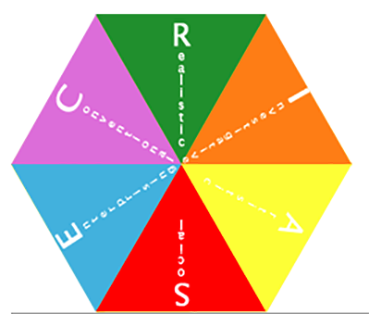Published on Feb. 8, 2017

Robert McDaniels, director of the MU Career Center, believes that deciding on a major and choosing a career can be like putting together a puzzle.
“To figure out what they want to do, students look at different jobs and work environments, get input from parents and professors and take assessments,” McDaniels says. “Those are all pieces of the puzzle that help people decide who they are and what they like doing.”
Although some students come to MU knowing they want to pursue a certain career, others take more time to put the puzzle together. For students who are unsure which major or profession is right for them, McDaniels recommends playing the Career Interest Game.
The Career Interest Game is an online exercise designed to help students identify majors and careers that align with their interests and skills. The game is based on John Holland’s theory that people and jobs can be classified into six groups: realistic, investigative, artistic, social, enterprising and conventional. Holland, an American psychologist who conducted research at MU, believed that people with different personalities prefer working in different environments. For example, people who fit in the social category like informing, helping and training others, so they might enjoy working as teachers, counselors and tour guides.
“The game is a great way for students to figure out a bit more about who they are,” McDaniels says. “It helps students match what they like doing and what they’re interested in to work environments that might be a good fit for them.”
Students begin playing the game by reading descriptions of all six groups. Then, students select the three groups that most accurately describe their skills, interests and attributes. The first letter of the names of the three selected groups make up a student’s Holland Code. Once students have their codes, they can learn more about careers, Mizzou departments and student organizations that match their codes.
According to McDaniels, students from all over the world visit the Career Center’s website to play the game. In 2016, the Career Interest Game had 71,541 page views. McDaniels says the game is so popular that other universities have asked for permission to recreate the game on their own websites.
“People like the game because it encourages students to explore and to take a look at many different possibilities,” McDaniels says.
Although playing the Career Interest Game is informative, McDaniels believes it is only one piece of the puzzle. He thinks it is important for students to take advantage of the additional resources and services the Career Center offers.
“We use the game as a stepping stone to spending more time with students and having them take different kinds of assessments,” McDaniels says. “The game is a great tool for getting students started and getting them thinking.”
To learn more about their Holland Codes and career interests, students can visit the Career Center to take a variety of assessments, including the Self Directed Search (SDS). Developed by Holland in 1971, the SDS is the most widely used career interest assessment in the world. After students take the assessment, they receive a report that provides information about their Holland Code, a list of possible career options and suggestions and resources to help students with their educational and career planning.
After students finish the assessment and read their report, they have a conversation about their results with a trained career specialist. Career specialists are undergraduate and graduate students who receive more than 100 hours of training to help people figure out their career paths.
“The Career Interest Game is a tool designed for students to use online, but we find that students benefit most by having a face-to-face conversation with our career specialists,” says Carrie Collier, senior student service coordinator at the Career Center. “The game is a good place to go for people to get some general information, but our purpose is to help students reflect through conversation.”
Tia James, a career specialist and a senior majoring in journalism, has taken the SDS and administers it to other students. She encourages anyone who wants to learn more about their career interests to take the SDS and talk with a career specialist.
“It’s a great starting point to dig deeper into your workplace values so you can find the career that fits well with you and that resonates with you,” James says.
According to Collier, more than 8,000 students visit the Career Center for walk-in visits every year.
“We are open to all students,” Collier says. “We are the home for those exploring students, those major-changing students and any student looking for a career services home.”